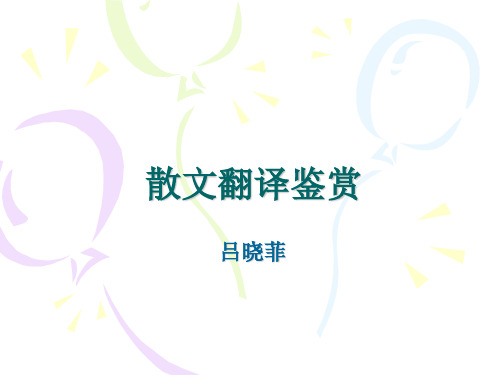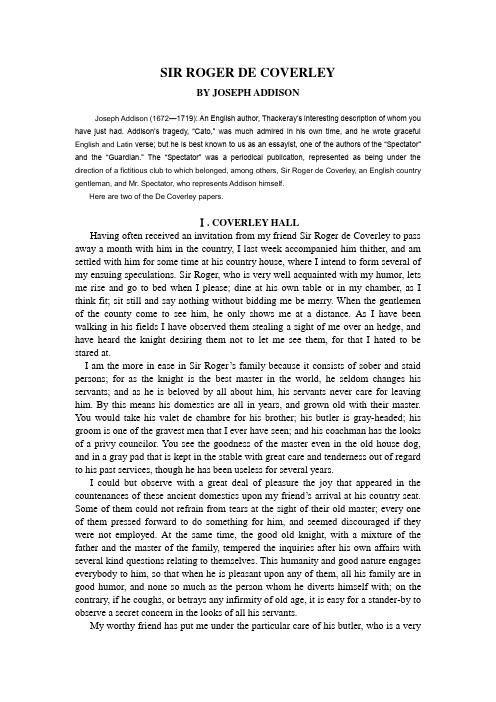散文中译鉴赏课件
人教版高中语文选修--外国诗歌散文欣赏3.《堤契诺秋日》课件(共15张PPT)

2、庄谐互现 寓庄于谐法,是指以幽默风趣的语言和诙谐揶揄 的笔调来表现严肃庄重、深刻丰富的思想内容的 写作方法。其特点是:语言笔调虽然幽默诙谐, 但思想、内容必须庄重深刻。 从看似平淡的对话中,读者可以品味到作家的智 慧,两者忍俊不禁的语言营造出淡淡的喜剧效果, 而这种喜剧性又服务于文章思想的严肃性,带给 读者无尽的思考。
Page 3
概述文章内容
故事塑造了两个人物形象,一个是游客, 一个是渔夫,两个人物就“渔夫要不要出海 捕鱼”的问题展开了一场对话。游客认为渔 夫应该趁着好天气多出海捕几次鱼,为以后 的富足生活打下基础;而渔夫则不以为然, 他觉得应趁着好天气晒晒太阳,看看风景, 打打盹儿。
Page 4
交流讨论
你更羡慕谁的生活方式?
译文 庄子和惠子漫步在濠河的桥上。 庄子说:“鲦鱼游弋得很从容,这鱼很快乐啊。” 惠子说:“你不是鱼,怎么知道鱼的快乐呢。” 庄子说:“你不是我,怎么知道我不知道鱼快乐呢。” 惠子说:“我不是您,当然不知道您的感知;您也不是鱼,您也不知道鱼的快乐,这不 就完了。” 庄子说:“请回到我们开始时的话题,你刚才说的‘你怎么知道鱼的快乐’这Pa句ge 话11,就
P表现神情的句子: “他兴奋得一时间连话都说不出来了”,“外国 人兴奋得又说不出话了”,“由于激动他又语塞 了”,“外国人以默默的兴奋心情说”等等,充 分表现了游客焦灼、急功近利的心情。
而表现渔夫的句子,如“回答是简短的,不假思 索的”,“宽慰地拍拍游客的肩膀”,“渔夫拍 拍他的背,像是拍着一个吃呛了的孩子”等等, 则充分表现了渔夫的闲适和乐天知命。
——池莉
Page 13
作业
1、为自己找十条幸福的理由并用优美的文 字表达出来。
2、课下阅读亨利希·伯尔的《卖笑人》,进 一步体会作者庄谐互见的文风。
汉英散文翻译鉴赏

二十岁的时候,挤在人头攒动的公共大巴上,吃着甜筒,挺开心。三 十岁之后,看见破旧肮脏的的士都心烦,拜托!油价一跌,就去买车 吧,一路开往小康。 At the age of twenty, I felt happy squeezed in a crammed bus eating an ice-cream. After I have turned thirty, I hate to look at the dirty, worn-out taxis. Thank goddess! Once the oil price declines, I’ll buy a car to myself and drive all the way to a comfortable life. At the age of twenty, I felt so contented sandwiched in a jammed bus, eating ice cream. After thirty,even the sight of a shabby and sordid taxi may sicken me.OK! When the oil price goes down, I’ll buy a car and drive along the road of Well-To-Do.
The country had grown rich, its commerce was large, and wealth did its natural work in making life softer and more worldly, commerce in deprovincializing the minds of those engaged in it. 那时候国家富足,商业发达;财富充盈的结果,是生活日趋柔糜,思 想日趋世俗,而商业发达之后,经商的人眼界日益开展,不再像当年 那样的固步自封。(夏济安译)
《金色花》散文诗二首PPT课件

节奏:前紧后松。 举例演示:当你吃过中饭,坐在窗前//读?罗摩衍那?,那 棵树的阴影//落在你的头发与膝上时,我便要//投我的小 小的影子在你的书页上,正投在//你所读的地方。 但是你会猜得出//这就是你的孩子的小小影子吗? 情感:喜悦、母子之爱和儿童特有的顽皮。
2.小组内分角色或分段朗读,然后全班展示。读完后 其他组紧扣朗读指导的要求进行评价。
活动:一到三组从文中找出孩子和母亲接近真实存在的依据,四到六 组找出孩子和母亲可能是虚构的依据。
要求:独立阅读全文后思考,自己有答案后和小组成员讨论交流,最 后全班交流。
(1) 真实存在的依据: 孩子的性格是天真、活泼、淘气,依恋热爱自己的妈妈。〔文中句略〕 母亲一直牵挂着孩子,而且勤劳能干,性格恬静温和。〔文中句略〕
2.品读文中某段文字,用自己的语言描绘一下诗中的 画面,可以用“ 我感受到这样的画面……〞的句式来 做恰当描述。发挥集体的智慧,比一比哪组描述得最美。
深入研读,探讨多重内涵
1.我们已经感受了散文诗的语言美,品味了画面美和意 境美,这些美都来自诗人的神奇表达。那么你觉得诗中的 孩子和母亲都是真实存在的吗?解决了这个问题或许可以 帮助我们发现美的根源所在。
(2) 虚构的依据: 孩子变成了金色花,还能散发香气,最后又变回来。 母亲的工作主要是沐浴、祷告、读?罗摩衍那?,似乎是 不食人间烟火的。
2. 作者为什么要将孩子和母亲写得既真实又带点神化气息呢? 文中的孩子和母亲都美好善良,有一些美化神化了,文中把孩子比作 印度的圣花金色花,而印度的金色花是最美丽的圣树上的花朵,用金色 花作喻表达了诗人对孩子的喜爱赞美。人们爱花儿,花儿也惠及人们, 正可以象征孩子回报母爱的心愿,对母亲的爱是圣洁美丽的。
集体诵读,读准读顺课文
英语经典散文鉴赏与翻译共23页25页PPT

41、实际上,我们想要的不是针对犯 罪的法 律,而 是针对,就 像影子 跟随着 身体一 样。— —贝卡 利亚 43、法律和制度必须跟上人类思想进 步。— —杰弗 逊 44、人类受制于法律,法律受制于情 理。— —托·富 勒
45、法律的制定是为了保证每一个人 自由发 挥自己 的才能 ,而不 是为了 束缚他 的才能 。—— 罗伯斯 庇尔
16、业余生活要有意义,不要越轨。——华盛顿 17、一个人即使已登上顶峰,也仍要自强不息。——罗素·贝克 18、最大的挑战和突破在于用人,而用人最大的突破在于信任人。——马云 19、自己活着,就是为了使别人过得更美好。——雷锋 20、要掌握书,莫被书掌握;要为生而读,莫为读而生。——布尔沃
END
B10文学实训之二:散文翻译鉴赏

SIR ROGER DE COVERLEYBY JOSEPH ADDISONJoseph Addison (1672—1719): An English author, Thackeray’s interesting description of whom you have just had. Addison’s tragedy, “Cato,” was much admired in his own time, and he wrote graceful English and Latin verse; but he is best known to us as an essayist, one of the authors of the “Spectator” and the “Guardian.” The “Spectator” was a periodical publication, represented as being under the direction of a fictitious club to which belonged, among others, Sir Roger de Coverley, an English country gentleman, and Mr. Spectator, who represents Addison himself.Here are two of the De Coverley papers.Ⅰ. COVERLEY HALLHaving often received an invitation from my friend Sir Roger de Coverley to pass away a month with him in the country, I last week accompanied him thither, and am settled with him for some time at his country house, where I intend to form several of my ensuing speculations. Sir Roger, who is very well acquainted with my humor, lets me rise and go to bed when I please; dine at his own table or in my chamber, as I think fit; sit still and say nothing without bidding me be merry. When the gentlemen of the county come to see him, he only shows me at a distance. As I have been walking in his fields I have observed them stealing a sight of me over an hedge, and have heard the knight desiring them not to let me see them, for that I hated to be stared at.I am the more in ease in Sir Roger’s family because it consists of sober and staid persons; for as the knight is the best master in the world, he seldom changes his servants; and as he is beloved by all about him, his servants never care for leaving him. By this means his domestics are all in years, and grown old with their master. You would take his valet de chambre for his brother; his butler is gray-headed; his groom is one of the gravest men that I ever have seen; and his coachman has the looks of a privy councilor. You see the goodness of the master even in the old house dog, and in a gray pad that is kept in the stable with great care and tenderness out of regard to his past services, though he has been useless for several years.I could but observe with a great deal of pleasure the joy that appeared in the countenances of these ancient domestics upon my friend’s arrival at his country seat. Some of them could not refrain from tears at the sight of their old master; every one of them pressed forward to do something for him, and seemed discouraged if they were not employed. At the same time, the good old knight, with a mixture of the father and the master of the family, tempered the inquiries after his own affairs with several kind questions relating to themselves. This humanity and good nature engages everybody to him, so that when he is pleasant upon any of them, all his family are in good humor, and none so much as the person whom he diverts himself with; on the contrary, if he coughs, or betrays any infirmity of old age, it is easy for a stander-by to observe a secret concern in the looks of all his servants.My worthy friend has put me under the particular care of his butler, who is a veryprudent man, and, as well as the rest of his fellow-servants, wonderfully desirous of pleasing me, because they have often heard their master talk of me as of his particular friend.My chief companion, when Sir Roger is diverting himself in the woods or the fields, is a very venerable man, who is ever with Sir Roger, and has lived at his house in the nature of a chaplain above thirty years. This gentleman is a person of good sense and some learning, of a very regular life and obliging conversation; he heartily loves Sir Roger, and knows that he is very much in the old knight’s esteem, so that he lives in the family rather as a relation than a dependant.I have observed in several of my papers that my friend, Sir Roger, amidst all his good qualities, is something of an humorist; and that his virtues as well as imperfections are, as it were, tinged by a certain extravagance, which makes them particularly his and distinguishes them from those of other men. This cast of mind, as it is generally very innocent in itself, so it renders his conversation highly agreeable and more delightful than the same degree of sense and virtue would appear in their common and ordinary colors. As I was walking with him last night, he asked me how I liked the good man whom I have just now mentioned; and, without staying for my answer, told me that he was afraid of being insulted with Latin and Greek at his own table, for which reason he desired a particular friend of his at the university to find him out a clergyman rather of plain sense than much learning, of a good aspect, a clear voice, a sociable temper, and, if possible, a man that understood a little of backgammon.“My friend,”says Sir Roger, “found me out this gentleman, who, besides the endowments required of him, is, they tell me, a good scholar, though he does not show it. I have given him the parsonage of the parish; and because I know his value, have settled upon him a good annuity for life. If he outlives me, he shall find that he was higher in my esteem than perhaps he thinks he is. He has now been with me thirty years, and, though he does not know I have taken notice of it, has never in all that time asked anything of me for himself, though he is every day soliciting me for something in behalf of one or other of my tenants, his parishioners. There has not been a lawsuit in the parish since he has lived : among them. If any dispute arises, they apply themselves to him for the decision; if they do not acquiesce in his judgment, which I think never happened above once or twice at most, they appeal to me. At his first settling with me, I made him a present of all the good sermons which have been printed in English, and only begged of him that every Sunday he would pronounce one of them in the pulpit. Accordingly, he has digested them into such a series that they follow one another naturally, and make a continued system of practical divinity.”As Sir Roger was going on with his story, the gentleman we were talking of came up to us, and upon the knight’s asking him who preached to-morrow—for it was Saturday night—told us the Bishop of St. Asaph in the morning and Dr. South in the afternoon. He then showed us his list of preachers for the whole year, where I saw with a great deal of pleasure Archbishop Tillotson, Bishop Saunderson, Dr. Barrow, Dr. Calamy, with several living authors who have published discourses of practicaldivinity. I no sooner saw this venerable man in the pulpit, but I very much approved of my friend’s insisting upon the qualifications of a good aspect and a clear voice; for I was so charmed with the gracefulness of his figure and delivery, as well as with the discourses he pronounced, that I think I never passed any time more to my satisfaction.Ⅱ. SIR ROGER PASSETH AWAYWe last night received a piece of ill news at our club, which very sensibly afflicted every one of us. I question not but my readers themselves will be troubled at the hearing of it. To keep them no longer in suspense, Sir Roger de Coverley is dead. He departed this life at his house in the country, after a few weeks’ sickness. Sir Andrew Freeport has a letter from one of his correspondents in those parts that informs him the old man caught a cold at the county sessions as he was very warmly promoting an address of his own penning, in which he succeeded according to his wishes. But this particular comes from a Whig justice of peace who was always Sir Roger’s enemy and antagonist. I have letters both from the chaplain and Captain Sentrey which mention nothing of it, but are filled with many particulars to the honor of the good old man. I have likewise a letter from the butler, who took so much care of me last summer when I was at the knight’s house. As my friend the butler mentions, in the simplicity of his heart, several circumstances the others have passed over in silence, I shall give my reader a copy of his letter without any alteration or diminution: —“HONORED SIR,—Knowing that you was my old master’s good friend, I could not forbear sending you the melancholy news of his death, which has afflicted the whole country, as well as his poor servants, who loved him, I may say, better than we did our lives. I am afraid he caught his death the last county sessions, where he would go to see justice done to a poor widow woman and her fatherless children, that had been wronged by a neighboring gentleman; for you know, sir, my good master was always the poor man’s friend. Upon his coming home, the first complaint he made was that he had lost his roast-beef stomach, not being able to touch a sirloin which was served up according to custom; and you know he used to take great delight in it. From that time forward he grew worse and worse, but still kept a good heart to the last. Indeed, we were once in great hope of his recovery, upon a kind message that was sent him from the widow lady whom he had made love to the last forty years of his life; but this only proved a lightning before his death. He has bequeathed to this lady, as a token of his love, a great pearl necklace and a couple of silver bracelets set with jewels, which belonged to my good old lady his mother; he has bequeathed the fine white gelding, that he used to ride a-hunting upon, to his chaplain, because he thought he would be kind to him; and has left you all his books. He has, moreover, bequeathed to the chaplain a very pretty tenement with good lands about it. It being a very cold day when he made his will, he left for mourning to every man in the parish a great frieze coat and to every woman a black riding-hood. It was a most moving sight to see him take leave of his poor servants, commending us all for our fidelity, whilst we were not able to speak a word for weeping. As we most of us are grown gray-headed in our dear master’s service, he has left us pensions and legacies which we may live very comfortably upon the remaining part of our days. He has bequeathed a great dealmore in charity which is not yet come to my knowledge, and it is peremptorily said in the parish that he has left money to build a steeple to the church; for he was heard to say some time ago that if he lived two years longer, Coverley Church should have a steeple to it. The chaplain tells everybody that he made a very good end, and never speaks of him without tears. He was buried, according to his own directions, among the family of the Coverleys, on the left hand of his father, Sir Arthur. The coffin was carried by six of his tenants, and the pall held up by six of the quorum; the whole parish followed the corpse with heavy hearts, and in their mourning suits—the men in frieze and the women in riding-hoods. Captain Sentrey, my master’s nephew, has taken possession of the Hall-house and the whole estate. When my old master saw him a little before his death, he shook him by the hand, and wished him joy of the estate which was falling to him, desiring him only to make a good use of it and to pay the several legacies and the gifts of charity which he told him he had left as quitrents upon the estate. The captain truly seems a courteous man, though he says but little. He makes much of those whom my master loved, and shows great kindness to the old house dog that you know my poor master was so fond of. It would have gone to your heart to have heard the moans the dumb creature made on the day of my master’s death. He has never joyed himself since; no more has any of us. ’Twas the melancholiest day for the poor people that ever happened in Worcestershire. This is all from,“Honored sir, your most sorrowful servant,“EDWARD BISCUIT.“P. S.—My master desired, some weeks before he died, that a book which comes up to you by the carrier should be given to Sir Andrew Freeport, in his name.”This letter, notwithstanding the poor butler’s manner of writing it, gave us such an idea of our good old friend that upon the reading of it there was not a dry eye in the dub. Sir Andrew, opening the book, found it to be a collection of Acts of Parliament. There was in particular, the act of Uniformity, with some passages in it marked by Sir Roger’s own hand. Sir Andrew found that they related to two or three points which he had disputed with Sir Roger the last time he appeared at the club. Sir Andrew, who would have been merry at such an incident on another occasion, at the sight of the old man’s handwriting burst into tears, and put the book in his pocket. Captain Sentrey informs us that the knight has left rings and mourning for every one in the club.。
人教部编版语文八年级上册第16课《散文二篇》课件

【串句记忆法】老人看到家族中人丁兴(xīnɡ)旺,心里 很高兴(xìnɡ)。
字词清单
形
近
比喻没有眼光,取舍不当。
字
犊( dú )牛犊
椟( dú )买椟还珠
茸( rónɡ )茸毛
牍( dú )尺牍
葺( qì )修葺
赎( shú )赎罪
字词清单
词 • 臼齿:磨牙的通称。
语
集 • 茸毛:指人或动物的绒毛;植物体上的细毛。
写 遏制( è ) 濒临( bīn ) 深渊( yuān)
星辰( chén ) 飓风( jù ) 肆意( sì )
俯瞰( kàn ) 云霄( xiāo ) 呼号( háo )
与眼睛相关,故为“目”旁。
字词清单
多
音 字
( háo )呼号 号
( hào )号召
表示“拖长声音大声叫唤, 大声哭”的意思时,读háo。
深入探究
文中有很多富有哲理的句子,请同学们结合课文 旁批画一画,圈一圈,找出自己喜欢的句子,并 说明理由。
1.个人生命不像一件衬衣,当你发现它脏了、破了 的时候,就可以脱下它来洗涤,把它再补好。
对比
运用对比的手法,把不尽如人意的个人生命与 “脏了”“破了”的衬衣作比较,以衬衣的可洗可 补,突出时光的不可逆转,个人生命短暂、不可重 复的特点。使抽象的道理具体、通俗。
2.我们应该看到生命自身的神奇,生命流动着,永 远不朽。
怎样理解“生命自身”的不朽?
个体生命虽然是短暂的,但是,生命史是不朽 的,所以,“生命”自身是不朽的的。
3.感谢生命的奇迹,它分开来是暂时,合起来却是永
久。
怎样理解“分开来”“合起来”的意思?
“分开来”指的是个体生命;“合起来”指的是永不 休止的繁殖、蔓延的生命史。
七年级语文上册第7课《散文诗二首》之《金色花》课件
背景资料
《金色花》选自《泰戈尔诗选》(人民文学出版社2002年
版)。郑振铎译,略有改动。此诗是他的早期作品。这一时
期泰戈尔教、哲学、教育和道德等手段来改造国民性、改造社
会,从而实现民族自治。
贰
诵
读清字音
读
读准节奏
指 读出情感
点
读清字音
xī nì xiù gē
嘻 匿嗅 戈
嬉戏
2、妈妈在什么情况下,我与她进行了哪三次嬉戏?
妈妈 嬉戏
做祷告时
我
散发香气
读书时
将影子投 在书页上
去牛棚时
变回孩子求 妈妈讲故事
3、“我”变成了金色花一天中与妈妈进行了三次嬉戏,这样构思,在写作上用的 是什么手法?有什么好处?
妈妈
我
嬉戏
做祷告时
散发香气 新奇
美好
想
读书时
象
去牛棚时
将影子投
在书页上
《金色花》- 泰戈尔
学习目标
1、有感情地朗读诗文,培养鉴赏诗歌的能力。(重点)
2、品味散文诗的精美语言,理解诗句中限制、修饰性词 语的表达作用。(难点) 3、体会人间至深至爱的亲情,培养健康高尚的审美乐趣。
壹
课 前 导 读
背景知识
金色花
又译作:“瞻波伽”或“占波”, 印度圣树,木兰花属植物,开金色碎花。
dǎo yǎn xī péng
祷 衍膝 棚
读准节奏
......笑 嘻 嘻 地 在 空 中 摇 摆, 又 在 新 叶 上 跳 舞,妈 妈,你 会 认 识 我 吗?
你 要 是 叫 道:“孩 子,你 在 哪 里 呀 ?”我 暗 暗 地 在 那 里 匿 笑,却 一 声 儿 不 响。
经典散文翻译赏析:培根《论婚姻与独身》
husbands, as was said of Ulysses, vetulam suam praetulit immortalitati. 对家庭的责任心不仅是人类的一种约束,也是一种训练。那种独身的人,虽然在用起来
似很慷慨,但实际上往往是心肠很硬的,因为他们不懂得对他人的爱。 一种好的风俗,能 教化出情感坚贞的男子汉,例如像优里西斯(Ulysses)那样,他曾抵制美丽女神的诱惑,而 保持了对妻子的忠贞。
成了家的人,可以说对命运之神付出了抵押品。因为家庭难免拖累事业,而无论这种事 业的性质如何。所以是能为公众献身人,应当是不被家室所累的人。因为只有这种人,才 能够把他的全部爱情和财产,都奉献给唯一的情人公众。而那种有家室的人,恐怕宁愿把 最好的东西留给自己的后代。
Some there are, who though they lead a single life, yet their thoughts do end with themselves, and account future times impertinences. Nay, there are some other, that account wife and children, but as bills of charges. Nay more, there are some foolish rich covetous men, that take a pride, in having no children, because they may be thought so much the richer. For perhaps they have heard some talk, Such an one is a great rich man, and another except to it, Yea, but he hath a great charge of children; as if it were an abatement to his riches. But the most ordinary cause of a single life, is liberty, especially in certain self-pleasing and humorous minds, which are so sensible of every restraint, as they will go near to think their girdles and garters, to be bonds and shackles.
Of-Studies翻译与鉴赏PPT课件
privateness and retiring →幽居独处
4 discourse演讲/讲道;谈话/交谈
5 disposition (安排/布置/处理management) of business(事情/事务)
.
3
Studies serve for delight, for ornament, and for ability. Their chief use for delight, is in privateness and retiring; for ornament, is in discourse; and for ability, is in the judgement, and disposition of business.
译文1:读书给人乐趣、文雅和能力。人们独居或退隐的 时候,最能体会到读书的乐趣;谈话的时候,最能表现出 读书的文雅;判断和处理事物的时候,最能发挥由读书而 获得的能力。
译文2:读书可以怡情养性,可以摭1拾文采,可以增长才 干。在幽居独处时,最能体现其怡情养性的作用;在友朋 交谈中,最能体现其摭拾文采的作用;在处世论事之际, 最能体现其增长才干的作用。
译文3:读书足以怡情,足以傅2彩,足以长才。其怡情也, 最见于独处幽居之时;其傅彩也,最见于高谈阔论之中; 其长才也,最见于处世判事之际。
1摭(zhí):拾取/摘取(pick up; gather)
2傅:涂抹(如“傅粉”)
.
4
2
For expert men1 can execute 2, and perhaps judge of particulars3, one by one; but the general counsels4, and the plots, and marshalling of affairs5, come best from those that are learned.
人教版语文高二选修《中国古代诗歌散文欣赏》课件:第二单元 夜归鹿门歌
月亮 烟树 岩扉 松径 ——月夜山景图
赏析诗歌
画面一:黄昏江景图
1、诗中写了什 么时间、地点、 人物及其活动?
——黄昏;渔梁 渡头;人们争渡 回家,我归鹿门。
2、诗人听到了 什么?看到了什 么?诗人所见所 闻各有什么特点? 诗人心情感受如 何?
——钟声、喧闹声; 争渡情景;钟声显示 了山寺的安宁僻静, 渡头的喧哗声显示了 尘世的杂乱喧闹;诗 人在船上闲望沉思的 神情、潇洒超脱的襟 怀隐然可见。
结合全诗,试赏析本诗的对比艺术。
①前四句中,“山寺”句以钟鸣 衬托 隐居地环境的清幽,而这又 与争渡的喧嚣 形成鲜明的对比; 三四句人“向江村”,而我却“归 鹿门”,更是表现了诗人与世人的 相异之处。 ②后四句中,静态的环境描写与动 态的人物描摹形成对比,比出了诗 人与前贤的相通之处,表现了诗人 对于先贤的仰慕之情,从而塑造了 一个孤高的隐者形象。
3、4句和1、2句有什么关系?请结合诗句具体分析。
——第3句和第4句分别是对第2句、第1句的承接,进一步补
此充处。用了什么写法?表现了诗人什么感情?
——动静结合、对比;表现了诗人淡泊名利、与世无争、向往 隐居、怡然自得之情。(悠然的钟声 — 嘈杂的人声 佛门清 静 — 尘世纷繁)
画面二:月夜山景图
红日已高三丈透,金炉次第添香兽。红锦 地衣随步皱。
佳人舞点金钗溜,酒恶时拈花蕊嗅。别殿 遥闻箫鼓奏。
小 结
这首诗写“夜归” 的“归”途,实际上是从 世俗到隐逸的道路,作者 以清淡干净的笔墨,抒写 了归隐的情怀志趣,生动 地塑造了一个隐士形象, 构成了一种独到的意境。
九、知识迁移。(请同学们自己用置身诗境,缘景明情的方法自 知识迁移 己鉴赏一首诗歌)
- 1、下载文档前请自行甄别文档内容的完整性,平台不提供额外的编辑、内容补充、找答案等附加服务。
- 2、"仅部分预览"的文档,不可在线预览部分如存在完整性等问题,可反馈申请退款(可完整预览的文档不适用该条件!)。
- 3、如文档侵犯您的权益,请联系客服反馈,我们会尽快为您处理(人工客服工作时间:9:00-18:30)。
作者评价
• 弗朗西斯·培根,英国文艺复兴时期最重要的散作 家、哲学家。他不但在文学、哲学上多有建树, 在自然科学领域里,也取得了重大成就。培根是 一位经历了诸多磨难的贵族子弟,复杂多变的生 活经历丰富了他的阅历,随之而来的,他的思想 成熟,言论深邃,富含哲理。他的整个世界观是 现世的而不是宗教的(虽然他坚信上帝)。他是 一位理性主义者而不是迷信的崇拜者,是一位经 验论者而不是诡辩学者;在政治上,他是一位现 实主义者而不是理论家。
省译法
语序发 生变化
• Version2.爱情眷顾舞台甚于人生[1]。舞台之上,爱情时 而喜剧,时而悲剧;人生之中,爱情却时时招致不幸,
时而犹倩女幽魂,诱人致死,时而似河东狮吼,闻之胆 寒。
归化法 使用四字格
•
颜林海/译
• You may observe, that amongst all the great and worthy persons (whereof the memory remaineth, either ancient or recent) there is not one, that hath been transported to the mad degree of love:
Appearance
Sirens combine women and birds in various ways. In early Greek art Sirens were represented as birds with large women's heads, bird feathers and scaly (有鳞 的)feet.
复仇女神(furies)
• Erinys是希腊神话中复仇女神 的总称 • 三位黑色女神是秩序强有力的 维护者,其希腊名分别是 Alecto(无情)、Tisiphone(谟 杀复仇者)、Megaera(嫉妒), 据说她们因天神乌刺诺夫的血 而诞生,头发如蛇,手持火炬 和鞭子,是对暴力和亲人犯下 罪行之人的坚定的复仇者。有 时,她们是诅咒的化身,但同 时是道德秩序和法律秩序的捍 卫者,所以也被称作“和蔼可 亲的神”“可敬的女神”。在 许多地方人们将她们与美惠三 女神共同敬奉,但把她们看做 是对立的。
经典英语散文
中译版本欣赏
Of Love
论爱情
——培根
作者简介
• 中文名: 弗朗西斯· 培根 从“论真理”、“论死亡”、“论人的 深谙官场运作的培根。 • 外文名: Francis Bacon 从“论爱情”、“ • 国籍: 英国 论友情”、“论婚 姻与独身”等篇章中,可以看到一个富 • 出生日期: 1561年1月22日 有生活情趣的培根。 • 逝世日期: 1626年4月9日 从“论逆境”、“论幸运”、“论残疾” • 职业: 唯物主义哲学家,思想家, 等篇章中,可以看到一个自强不息的培 根。从“论作伪与掩饰”、“论言谈” 科学家 等篇章中,可以看到一个工于心计、老 • 代表作品:《新工具》《学术的迚 于世故的培根。培根的一生是追求知识 步》, 《新大西岛》, 的一生,也是追求权力的一生。 • 文学作品:《培根随笔集》 58篇 作为一个兼哲学家、文学家、法官和政
In Greek mythology, the Sirens were dangerous creatures,who lured nearby sailors with their enchanting music and voices toshipwreck(海难) on the rocky coast of their island.
培根名言
• 读叱使人明智,读诗使人灵秀,数学使人 周密,科学使人深刻,伦理学使人庄重, 逻辑修辞使人善辩,凡有所学,皆成性格。 类别:科学 、人生、读书 • 青年人比较适合发明,而不适合判断;适 合执行,而不适合磋商;适合新的计划, 而不适合固定的职业。类别:人生&青年 • 合理的安排时间,就等于节约时间。类别: 节约、时间 • 就是神,在爱情中也难保持聪明。类别: 爱情
• 版本二:人脆弱之时,爱情最易侵入,无论春风得意之际, 还是伤心失意之时,后者虽未为常见;得意伤心之时,爱情 之火易燃且挚。是故,爱情实乃愚蠢之子。但凡心生爱情且 束之以理者,皆能使之有益于事业、行为、生活。若有碍于 事业,爱情必致人厄运,人生目标,则难以成真。
SUMMARY
•了解作者 •了解写作背景
理解原文思想
•版本一 •版本二 •直译法、意译法、归化 •省略法、增补法
正说与反说 倒置法,调整语序或句序
结合例子 学技巧 运用技巧
进行比较
Homework
该文章继续迚行翻译欣赏,对比不同版本,找出各自翻译的 优缺点,学会运用其中的翻译技巧,自己可尝试翻译。 This passion hath his floods, in very times of weakness; which are great prosperity, and great adversity; though this latter hath been less observed: both which times kindle love, and make it more fervent, and therefore show it to be the child of folly. They do best, who if they cannot but admit love, yet make it keep quarters; and sever it wholly from their serious affairs, and actions, of life; for if it check once with business, it troubleth men's fortunes, and maketh men, that they can no ways be true to their own 爱情最容易入侵,那就是当 人得意春风,忘乎所以和处境窘困孤独凄零的时候,虽然后 者未必能得到爱情。人在这样的时候最急于跳入爱情的火焰 中,由此可见,“爱情”实在是“愚蠢”的儿子。但有一些 人,即使心中有了爱,仍能约束它,使它不妨碍重大的事业 。因为爱情一旦干扰情绪,就会阻碍人坚定地奔向既定的目 标。
• The stage is more beholding to love, than the life of man. For as to the stage, love is ever matter of comedies, and now and then of tragedies; but in life it doth much mischief; sometimes like a siren, sometimes like a fury.
•
•
正说与反说
等于"s"
Version1. 你可以看到,一切真正伟大的人物( 无论是古人、今人,只要是其英名永铭于人类记忆中的),没 有一个是因爱情而发狂的,
•
Version2.君不见:但凡伟人,(无论 古今,凡考据能及者,)未见有因情而痴者。
塞壬(Siren)
塞壬来源自古老的希 腊神话传说,在神话中的 她被塑造成一名人面鸟身 的海妖,飞翔在大海上, 拥有天籁般的歌喉,常用 歌声诱惑过路的航海者而 使航船触礁沉没,船员则 成为塞壬的腹中餐。
be beholding to "„受„关注„", 在这里进行意译
•
Version1.舞台上的爱情生活比生活中的爱情要美好得多。
因为在舞台上,爱情只是喜剧和悲剧的素材, 而在人生中,爱情却常常招来不幸。 它有时象那位诱惑人的魔女,有时又象那位复仇的女神。
佚名/译
• The stage is more beholding to love, than the life of man. For as to the stage, love is ever matter of comedies, and now and then of tragedies; but in life it doth much mischief; sometimes like a siren, sometimes like a fury.
